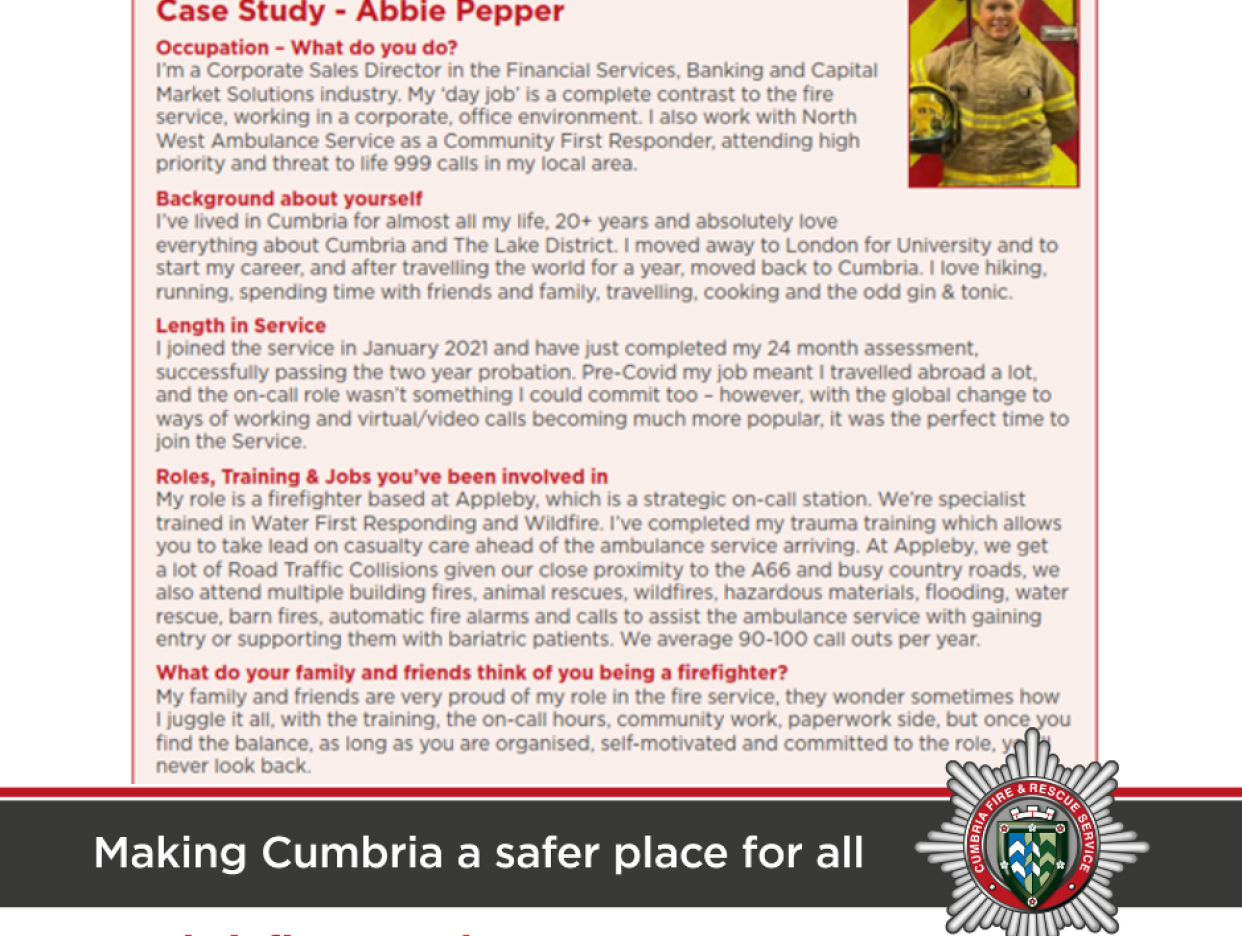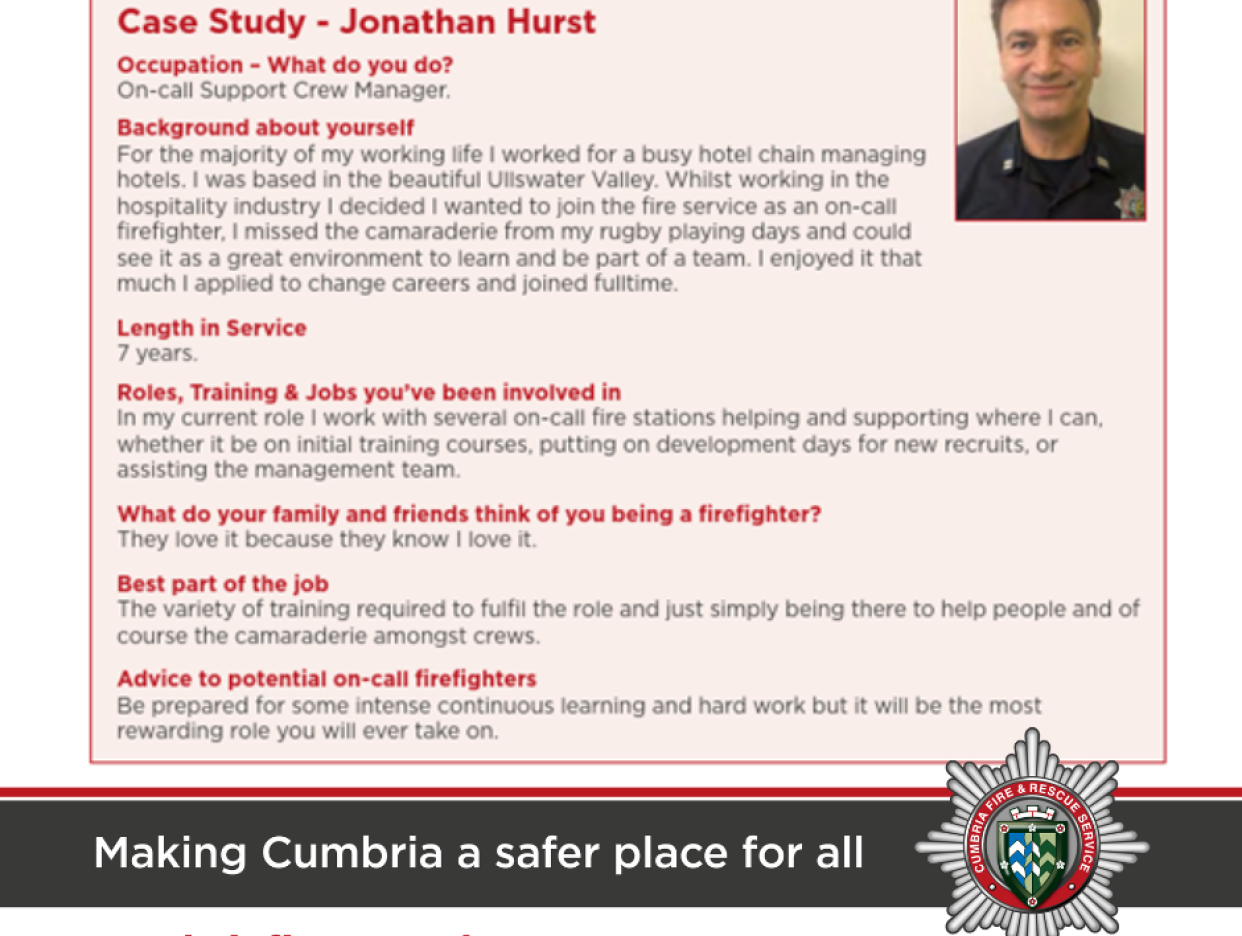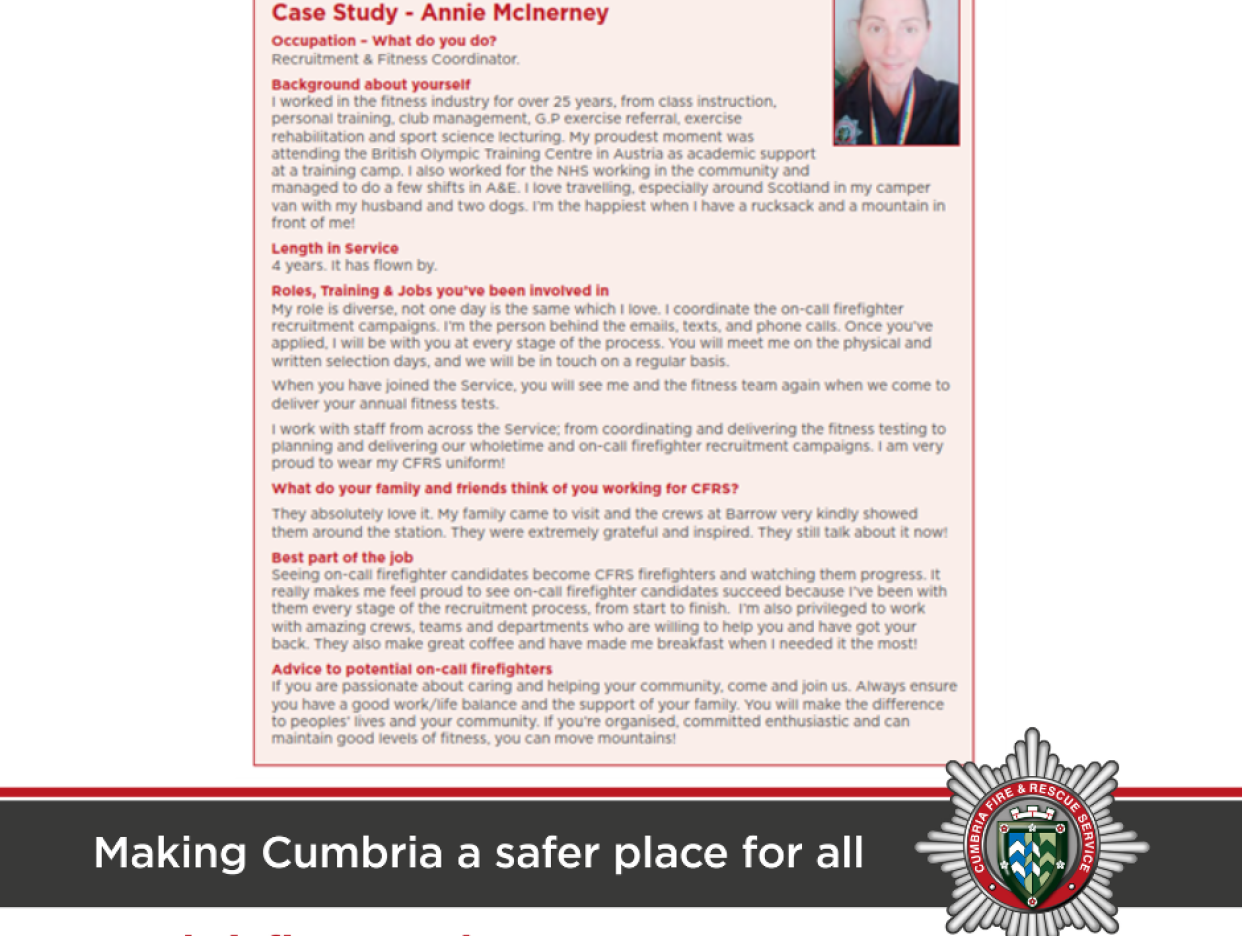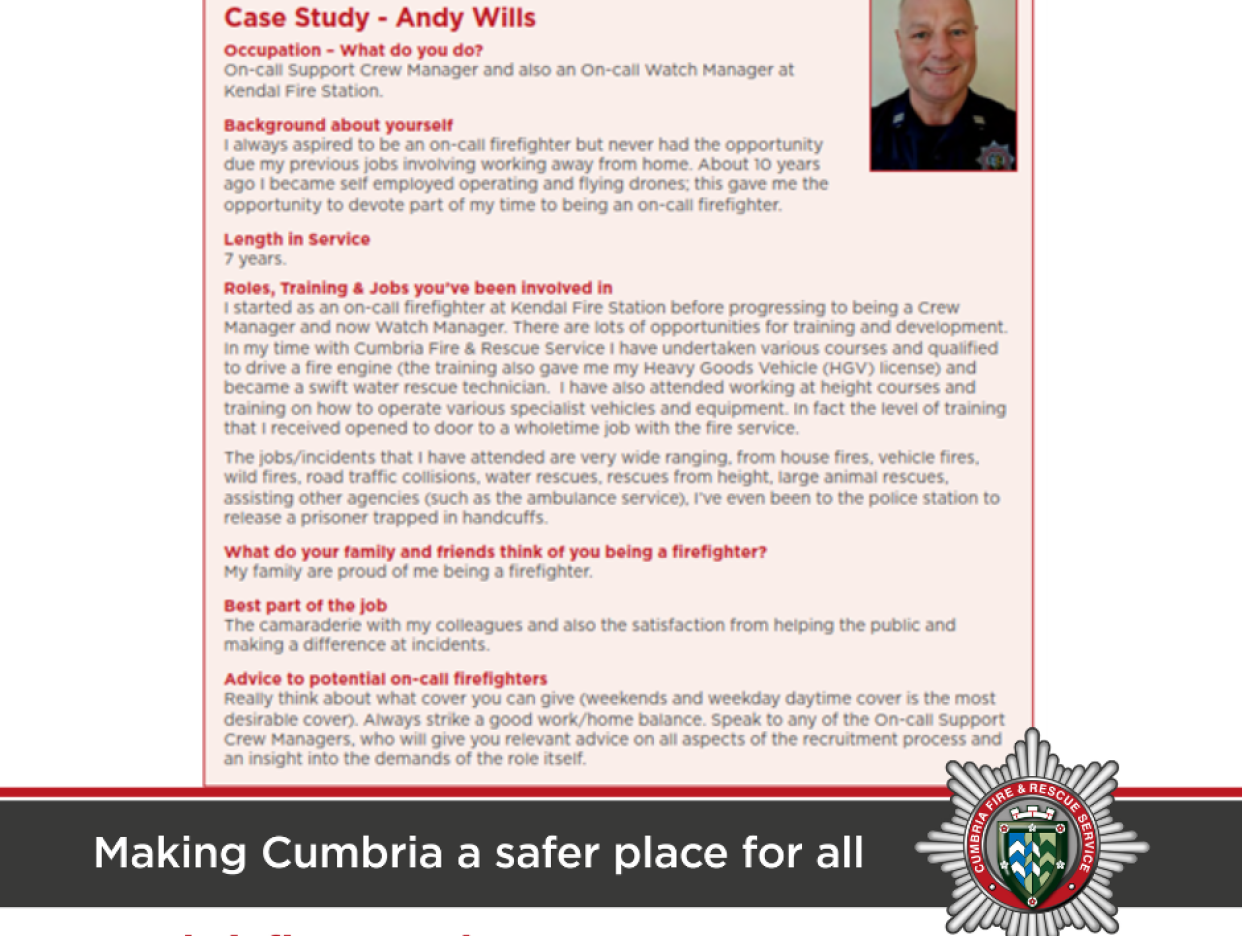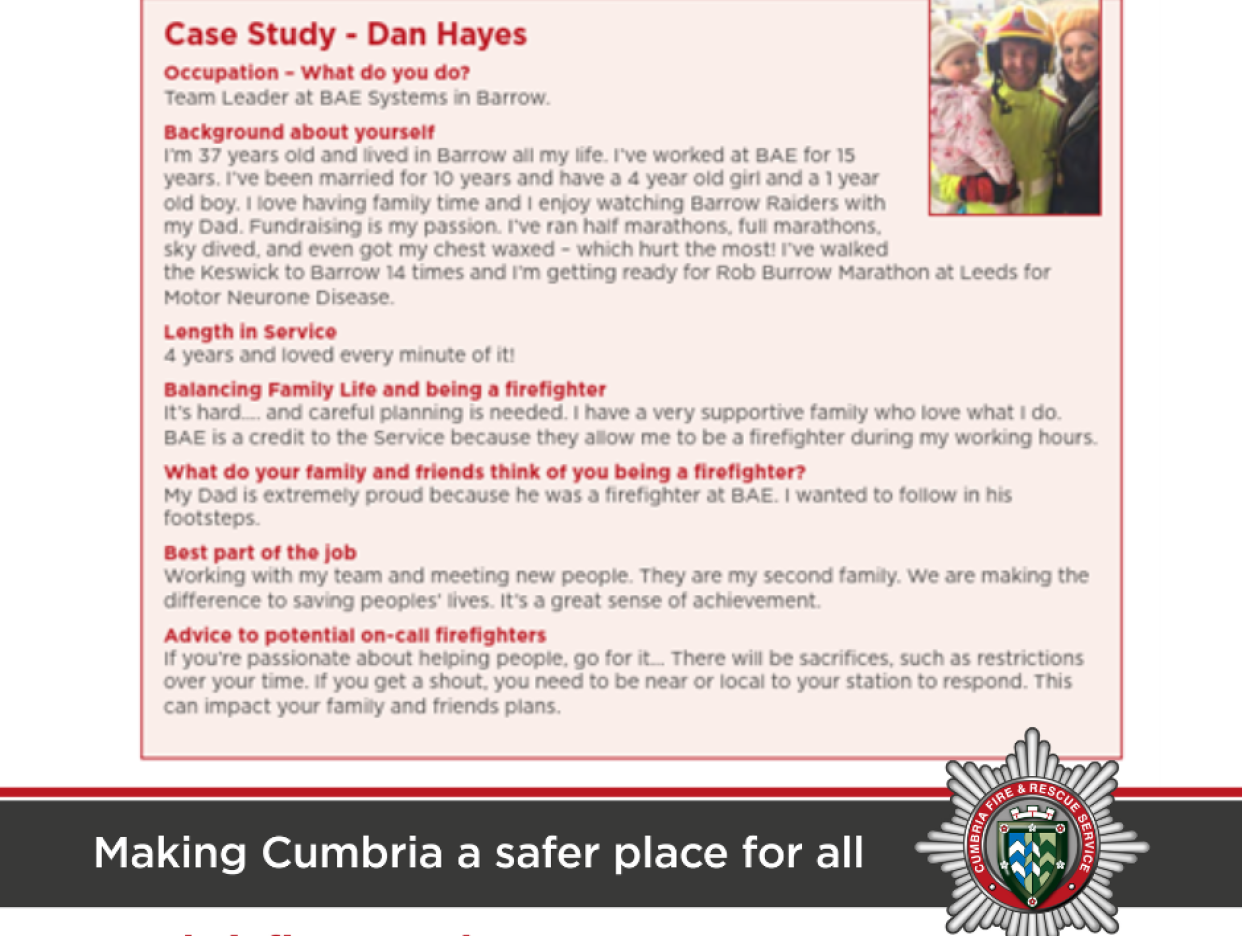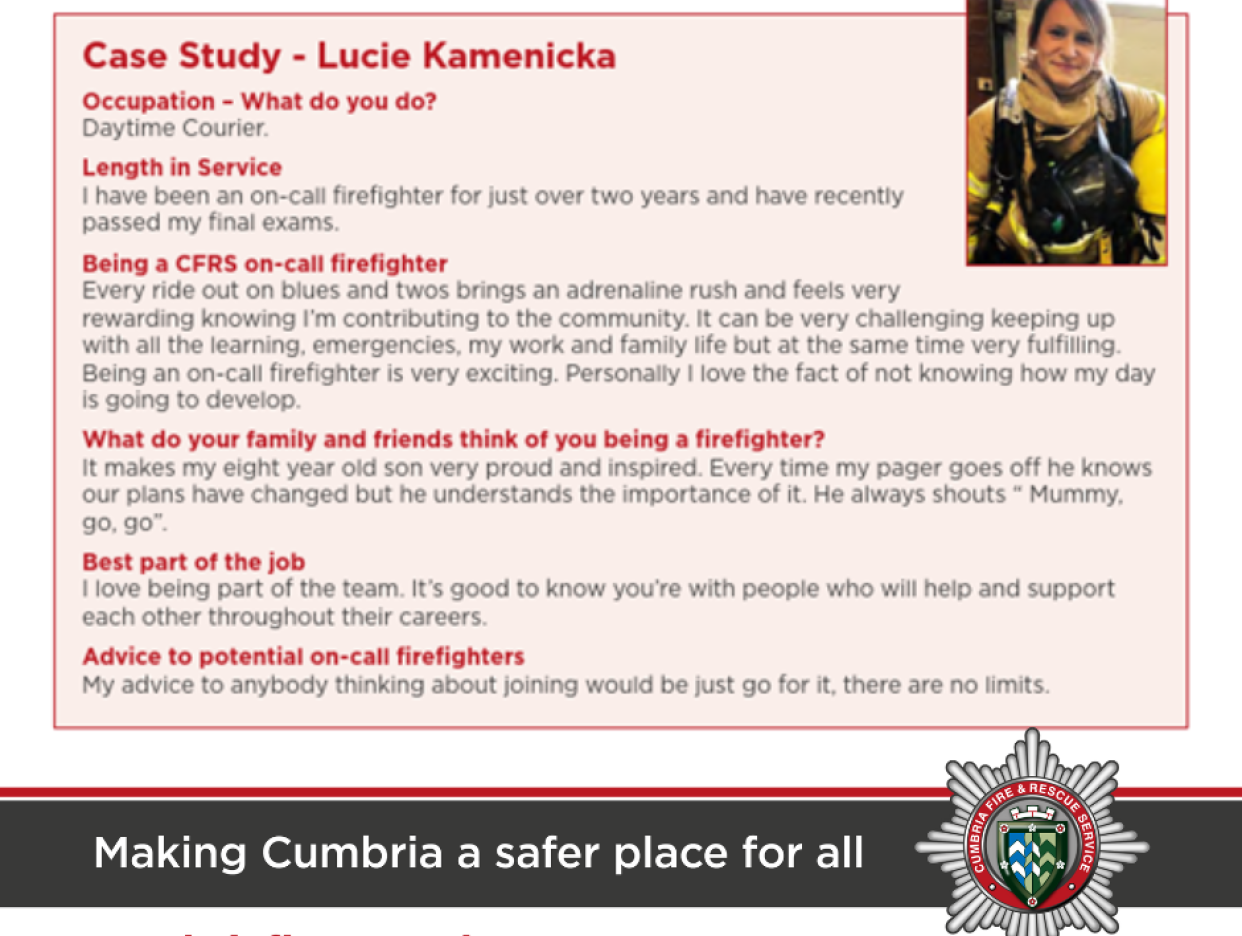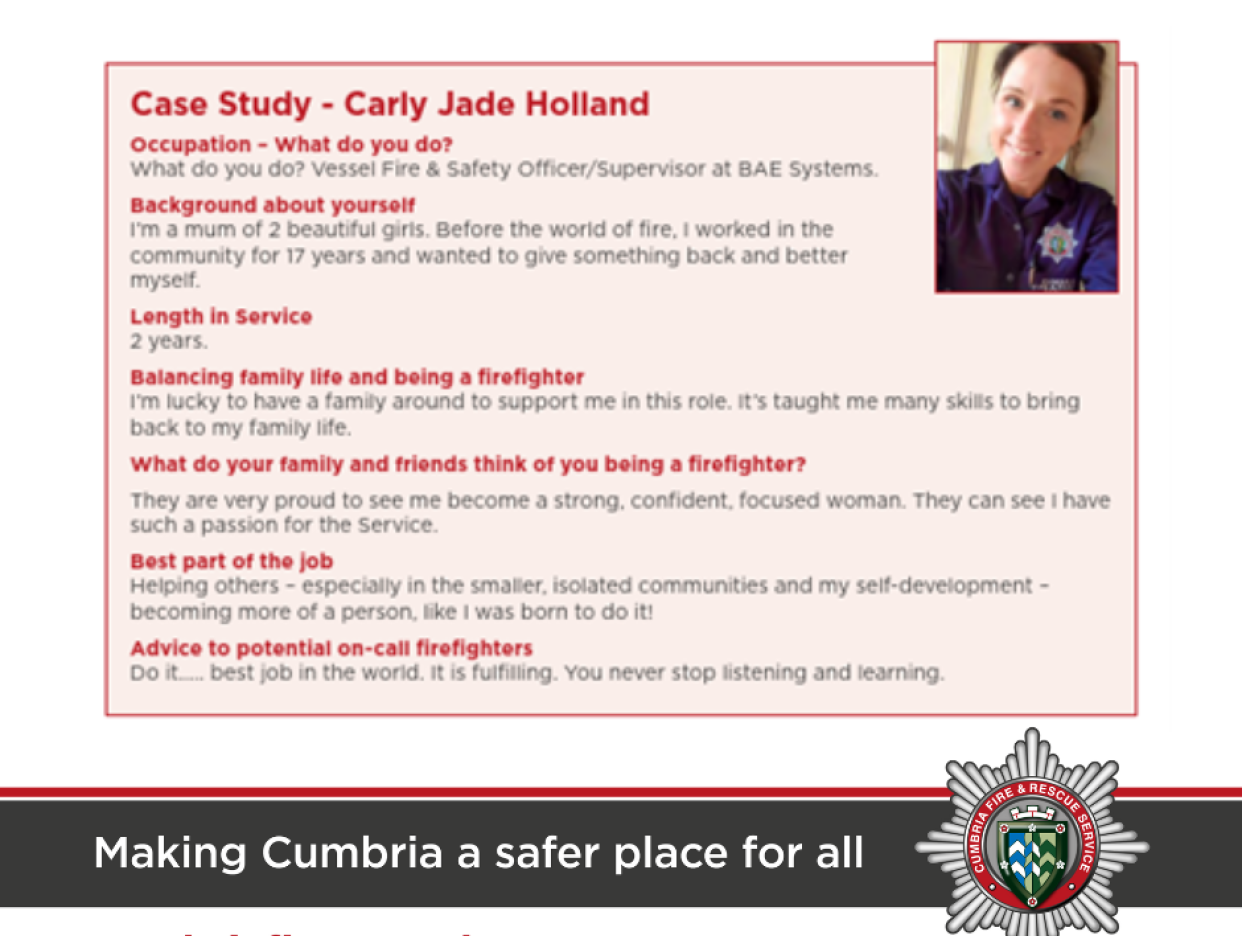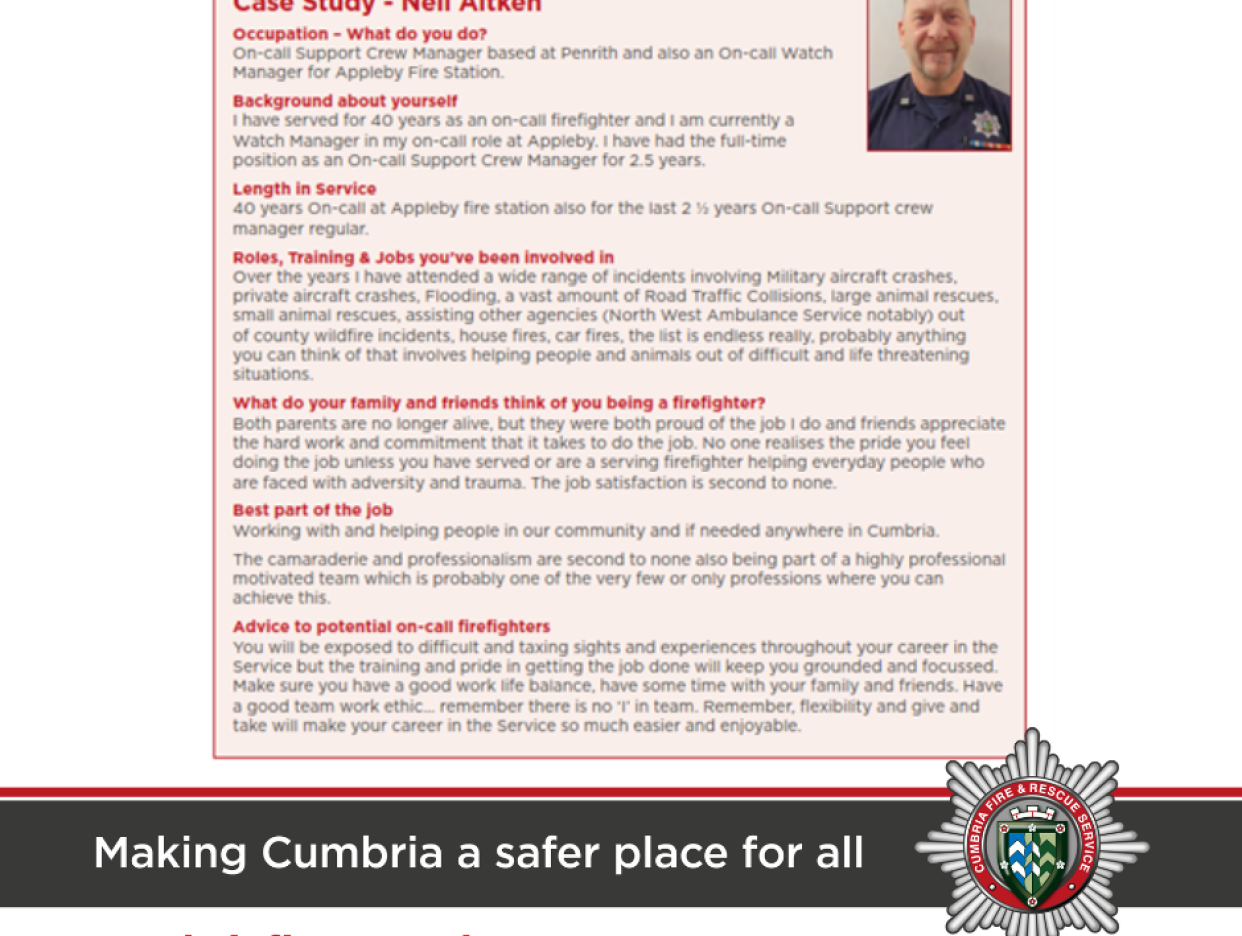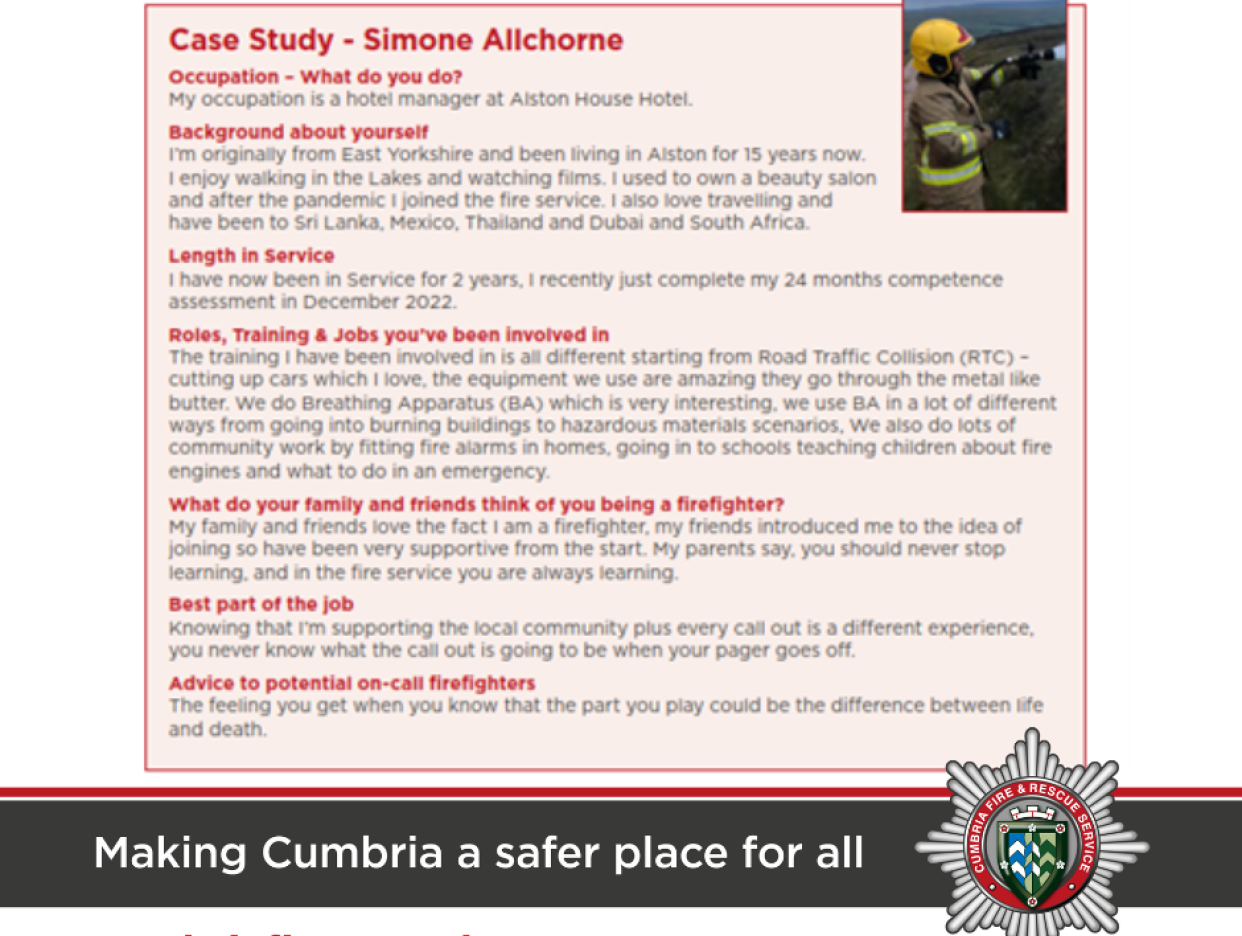On-Call Firefighter Recruitment
Recruitment is now open!
We are excited to share that the recruitment for On-Call Firefighters at Cumbria Fire and Rescue Service is now open.
Please read all the information below and get in touch with the dedicated recruitment team if you have any queries, at Recruitment@cumbriafire.gov.uk
Below is detailed information on upcoming Engagement Sessions, the Application process, Testimonials from our On-Call staff, and much more - please keep scrolling down!
To sign up to receive our recruitment newsletter, containing all the latest vacancies, directly into your inbox, click here
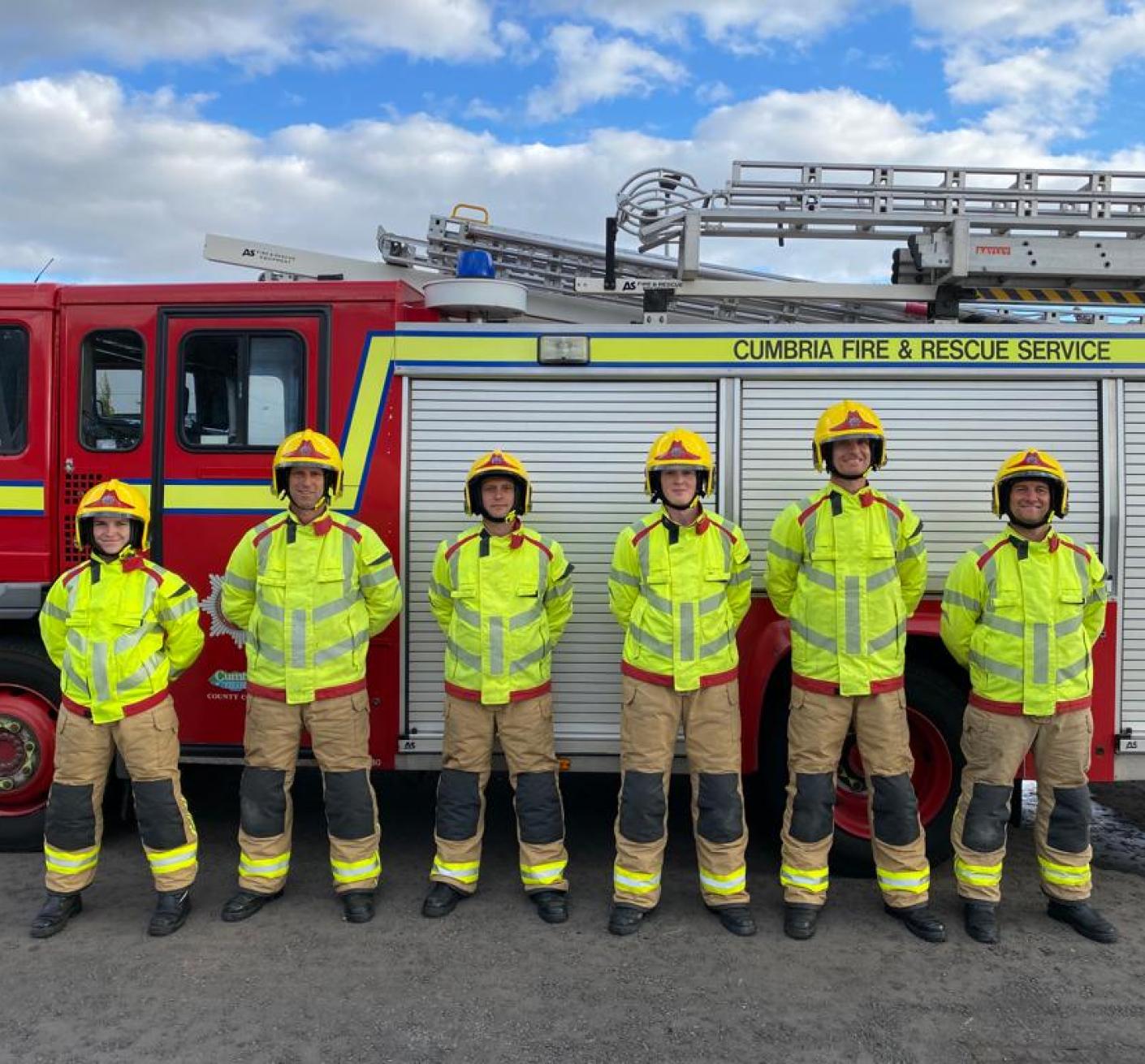
The Recruitment Process
Thank you for your interest in becoming an On-Call Firefighter with Cumbria Fire & Rescue Service.
You can apply to be an On-Call Firefighter at any time, using our new Registration Form (linked further down the page).
For 2025 we are holding 2 On-Call Recruit courses, one in July 2025 and the other in November 2025, and the below process will be used for both these course dates.
Register Your Interest & Engagement Sessions
The beginning of your journey with us is to complete our updated Registration Form and attend our virtual and in-person engagement sessions, details all below.
The Recruitment Team will get in touch
Once you have completed the Registration Form, the recruitment team will be in touch to discuss the next steps. For candidates who are interested in one of our Spotlight Stations (explained below), you will be invited to complete the next steps of the process, however all candidates will be kept in touch with.
Receive Recruitment Pack and Checking Availability
You will receive a On-Call recruitment pack from the recruitment team. This pack contains everything you need to apply and support you through the process. You may be invited to attend a recruitment evening and speak with the relevant Manager at the station, where you can have an informal chat about the role, ask any questions and also complete an Availability (124a) Form, this form can be found inside the recruitment pack. Further information on the Availability Form is below.
The pack also contains an Employers Consent Form and an Eyesight Standards Form. Further information is below.
Online Assessment
Also part of the next steps will be the timed online assessment. This is a simple mental agility test, there is no need to for any revision prior to this test. You will by given 15 minutes in which to answer 30 questions, if you have indicated on your application that you require reasonable adjustments these will be discussed with you prior to your test.
Practical Selection Days
If you have made it to this stage in the process you will be invited to a Practical Selection Day (morning or afternoon session). Further information about the practical and physical tests is below, and we have also got some excellent fitness tips below!
Interview
If successful on the Practical Selection Day, you will be invited to an interview. The interviews last around 30 minutes and will either be virtual or in-person (TBC).
Pre-Employment Checks
Follow a successful interview, you will receive a conditional offer of employment and we will begin Pre-Employment Checks. More information on the required checks is below.
Medicals
A key part of the Pre-Employment Checks is a full medical. The Occupational Health team will be in touch to book this in with you on set dates, detailed below.
Start your On-Call Training Course!
Once you have completed the Pre-Employment Checks to a satisfactory standard and passed the medical, the Learning and Development team will be in touch to share details of the Training Course. Further information is below!
The Process
Please see below for detailed information on the key stages of the On-Call recruitment process.
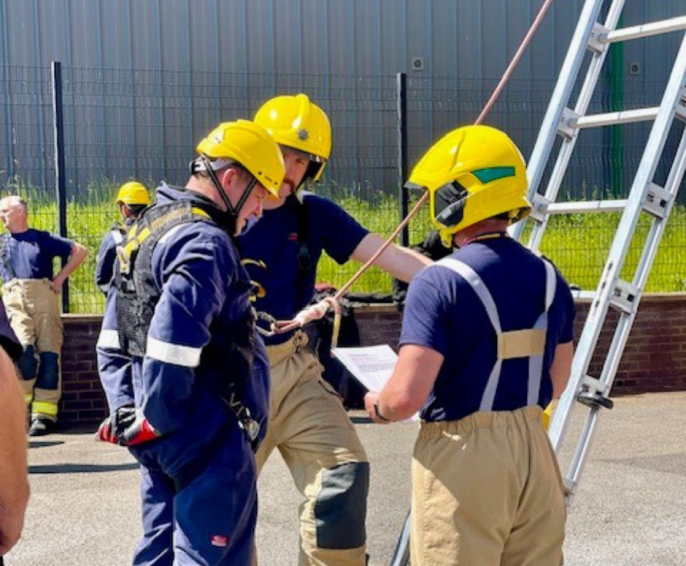
Key Information
For Candidates, Families, and Employers
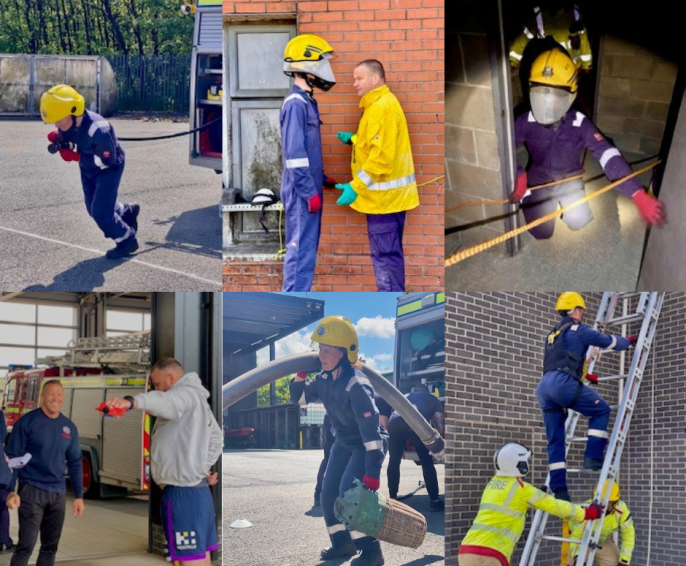
Fitness Top Tips
How to prepare for the Practical Selection days and be fit to become a Firefighter!
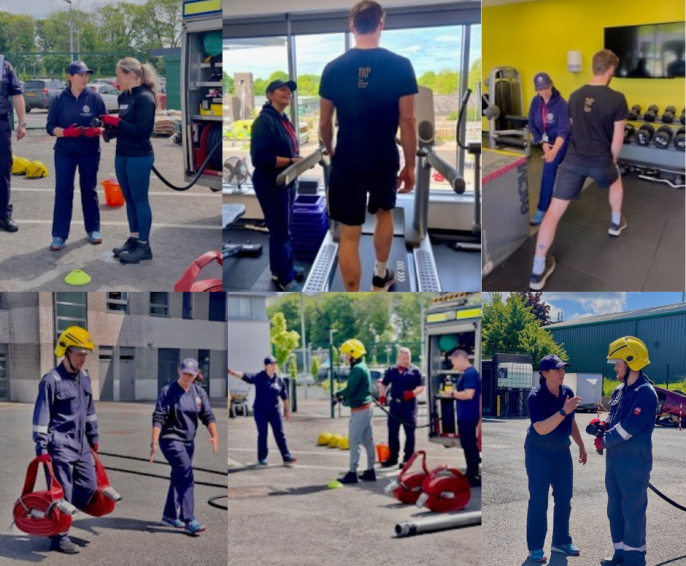
Preparing for the Practical Selection Days
Firefighters undertake a range of roles across response, prevention and protection, all of which require a level of physical fitness.
Your fitness will be tested as part of the application process to become a firefighter. This section explains why it is important for firefighters to be fit, what physical activity the job involves and gives you advice on activities you can undertake to prepare for the recruitment process.
Why do firefighters need to be fit?
Being a firefighter involves responding to emergency situations and working closely with the local community to prevent fires happening in the first instance.
The work often involves responding to rapidly changing situations in different environments and weather conditions. This requires a range of skills including good communication, team-work and a level of physical fitness.
Examples of physical activities that can be regularly required by firefighters as part of their role include hose runs, climbing stairs of high-rise buildings, working in a team to lift ladders, using ropes to manoeuvre equipment up tall buildings and rescuing people and animals.
Improving fitness
Being a firefighter requires cardiovascular fitness, strength and flexibility. You don’t necessarily have to join a gym or buy equipment to improve in these areas. Many of the suggested exercises in this guide can be done at home or in your local park.
Warming up/cooling down
You should warm up before you undertake any physical activity. Warming up prepares your body, helping to improve performance and reducing the risk of injury by increasing blood flow through the body and reducing muscle stiffness.
Common warm up exercises include, walking/jogging, low intensity activities and stretching. Cooling down after you exercise is as important
as warming up. Lowering the intensity of your exercise before you stop will gently lower your pulse and prepare your body for recovery.
You should also adapt your training plan every month or so to challenge yourself and make sure you continually improve.
Correct exercise technique is essential to improve your fitness and avoid injury. If you have any doubt about your ability to do any of the exercises, please seek advice from a qualified professional or ask for some help for from our fitness advisors.
Cardiovascular
Cardiovascular exercise is sustained or prolonged physical activity that raises your heartbeat. It includes most activities you would think of as ‘exercise’.
- Swimming
- Rowing
- Cycling
- Running
- Climbing
- Team Sports
- Group Exercise
- Skipping
Strength
Strength training works your muscles as they move against resistance, developing your muscular strength and endurance. This will allow you to lift, lower, push and pull heavy objects and produce force during repetitive movements over longer periods of time.
You can use your own body weight as resistance (e.g. press ups) and/or do exercises that use external loads (e.g. dead lift).
- Squat
- Shoulder Press
- Step Ups
- Press Up
- Dead lift
- Lunge
- Rotation Twists
- Bent Over Rows
Flexibility
Activities that lengthen and stretch muscles can help you prevent injuries, back pain and balance problems. Stretching gets blood and oxygen flowing to your muscles so they can more easily achieve their full range of motion.
Exercise Recommendations
- Perform strength conditioning sessions that work all the major muscles (legs, hips, back, abdomen, chest, shoulders and arms) at least 2 days a week
- Perform a minimum of 150 minutes of moderate intensity exercise a week or 75 minutes of vigorous intensity exercise a week
- Spread exercise evenly over 4-5 days a week, or every day
Reference: American College of Sports Medicine
Warm up exercises (5-8 minutes)
Your warm up should include a pulse raiser and dynamic stretches.
- Walk 1 minute
- Light jog 1 minute
- High knees 30 seconds
- Heel flicks 30 seconds
- Side steps 30 seconds
- Walking windmills 30 seconds
- Walking Lunges 30 seconds
- Hip Rotations 30 seconds.
Cool down exercise (5-8 minutes)
Your cool down should include exercises to lower your heart rate and developmental stretches to increase your flexibility. You shouldhold each stretch for 30 seconds, especially your hamstrings and hips flexors.
- Triceps stretch
- Shoulder stretch
- Hamstring stretch
- Calf stretch
- Quadriceps Stretch
- Hip Flexor Stretch
Creating a healthy eating pattern
Here is some advice on how to eat a healthy, balanced diet. It can help with your training and get the right type of fuel for energy.
- Choose vegetables from different subgroups – dark green, red and orange, legumes (beans and peas), starchy, and other
- Consume the whole fruit versus fruit juice
- Half or more of grains should come from whole grains
- A variety of proteins should be consumed including lean meats and poultry, eggs, seafood, nuts, seeds, soy products and legumes
- Healthy fats and oils should be substituted for those containing saturated fat and/or trans fat
- Drink 8-10 glasses of water a day. Being dehydrated efforts both your physical and mental performance
- Research shows that a healthy eating pattern limits saturated fats and trans fats, added sugars, and sodium that can effect both your health, wellbeing and fitness.
Reference: American College of Sports Medicine, 2017
Case Studies
Please see below some Case Studies of service members who are all passionate and dedicated to On-Call.


